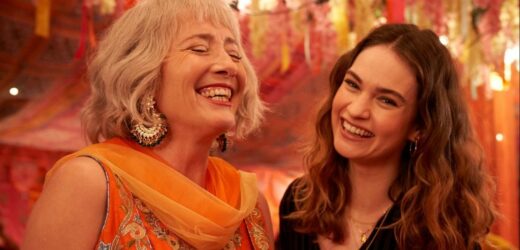There are very few movie genres in which Emma Thompson hasn’t left her mark, but she’s established a special pedigree in romantic comedies: from “The Tall Guy” to “Sense and Sensibility” to “Love Actually” to “Good Luck to You, Leo Grande,” she’s explored love in more ways on screen than most people get to experience in real life.
In the romantic entanglements of writer-producer Jemima Khan’s “What’s Love Got to Do With It?,” Thompson’s more of a well-meaning instigator than an active participant, playing a divorcee named Cath who clumsily tries to make a match for her serially-single filmmaker daughter Zoe, played by Lily James. Zoe, meanwhile, is more interested in documenting the arranged (or “assisted,” they rebrand it) marriage agreed to by her childhood friend Kazim (Shazad Latif), not realizing the complicated feelings that his impending nuptials are igniting in her about relationships past, present and future.
Thompson recently spoke to Variety about her role in “What’s Love Got to Do With It?,” whose effervescent surprises pivot at a nexus between romance, religion and culture. In addition to talking about her “inappropriate” character Cath, Thompson explained what appealed about the film’s unique approach to a number of heady topics, and finally reflected on the perception (and mistreatment) of romantic comedies as a genre even while observing how difficult they are to do well.
In Cath’s first scene she uses the word “exotic” to describe her Pakistani neighbor’s celebration, which is a well-meaning but very charged word in 2023. I’m curious, as an actor, what does a line like that tell you about this character for your performance?
Well, she’s so inappropriate. I love that about her, that she was just so casually inappropriate and culturally so specifically and typically English. And funnily enough, she connects to a character from when I was still doing comedy — I was 14 years old, I did a sketch that was written by actually a jazz musician, and he based the sketch on Lenny Bruce’s sketch, “How to Relax Your Colored Friends at Parties.” And the sketch that this guy had written was a Hampstead hostess who was terribly, terribly pleased and proud that she had a Black person at her cocktail party. Cath is that sort of person. I did that sketch 50 years ago, and that character is still so present in suburban, ordinary people just doing their ordinary stuff and just quietly saying completely inappropriate, weird things that just reveal the fact that they know absolutely fuck-all about the people that they’re interacting with. And yet, because Jemima Khan must have experienced this so many times herself, she’s very forgiving towards her. That’s why, I suppose, the family don’t blame her, then don’t say, “Actually, we’d rather not see you.” They know that she really needs them — she’s very vulnerable, really, and if she weren’t with that family and having a good time with them, she’d be at Alcoholics Anonymous.
How did this film’s intersection of romance and religion and culture uniquely resonate with you, particularly as a person who is quoted as being an atheist?
Actually it’s not even the faith; it’s this thing of arranged marriage I found so interesting, because I think to myself, well, I’d probably be quite good at finding my children someone to marry. And we make all sorts of assumptions about who we could find. And then they find someone we feel is completely inappropriate, and it all turns out to work. But if you consider, as Jemima does in the show, the rates of divorce in this country, and the fact that, of course, it’s a different culture. And one of the things that people react to very, very strongly is Shazad’s character Kaz says to his mother, “I just want to be a good son.” This thing of being a good son is really embedded in Islam in a way that in Christianity, not in the Church of England, Anglican kind of communities, there doesn’t seem to be the same emphasis on that. But I found that very moving. And I know Asian friends say that that’s the thing that makes them cry, because he’s doing his best to be a good child. And I think that at the bottom of all of this is this relationship between parents and children and children trying not to disappoint parents and parents trying their best with children, but often getting it really terribly, terribly wrong. So in the end, it always ends up being about communication and being as honest as possible without being cruel.
But if you think about the way in which our attitude as a nation changed to, for instance, homosexuality and AIDS during the AIDS crisis, when people really were suffering and dying in the thousands like flies, it was just dreadful, and then these enormous shifts in attitude to LGBTQ, et cetera, groups at that time, it was very, very valuable. So all our painful experiences have so much to teach us and so many walls to tear down. And that’s what I really liked about this was, it’s a comedy, but it’s about the neighborly wall, the walls that you put up inside yourself, the walls that you have to tear down in order to really start communicating in a valuable way. I thought that she’d managed to make a kind of very light comic symphony of that. It was a little operetta, like [Jacques] Offenbach, you know?
The audience immediately recognizes the chemistry between the two main characters but they take the course of the film to figure it out. After being in more than your share of romantic comedies, what is the key to deploying those kinds of tropes in a way that makes the audience eager to follow the journey, as opposed to waiting impatiently for them to figure out what we see immediately?
Romantic comedies are no more formulaic than any other kind of movie. We’re just ruder about them in the same way as what was described even by Jane Austen as “stupid female literature.” George Eliot said all of these gothic romances that started when women started to write books were absolutely shat upon from a great height by pretty much everybody. But what’s interesting is that the male storytelling, the “this is where I save the world,” it’s just as obvious, just as if not more repetitive. A really good romantic comedy is actually quite hard to come by. And the really good ones are the ones that take their inspiration from people like Jane Austen, who at the same time as, yes, creating a story at the end of which give you the happy ending that clearly she felt was important, but the journey involves a really interesting examination of where society is and where everyone is within that society at the time. So a really good romantic comedy will be multicultural. Absolutely fantastic when it can be that, and also when it can have a really large cast of people.
So it’s not just about those two romantic people connecting with each other. It draws a really specific world. And I think that’s why this movie’s successful, because you see all sorts of relationships drawn in it. And I think Jemima did such a wonderful job of specifying who everybody was and why. Even George Eliot, who was one of the greatest intellects of her time, wrote books where two people at the end who want to get married, get married, like Dorothea and Will Ladislaw. And yet, the journey towards it is absolutely fraught, and also fascinating. There is this incredible portrait of human life. It’s just a kind of hook, isn’t it?
Read More About:
Source: Read Full Article


